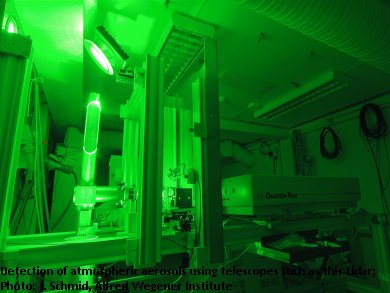Aerosols – small droplets or particles floating in the air – reflect a part of the sunlight before it reaches the ground, they radiate heat themselves, and they play an important role in the formation of clouds and influence the chemistry of the atmosphere. The formation of aerosols is frequently dependent on climate processes. However, the processes behind are not understood and cannot be used in global climate models.
The new research cluster “Aerosols and Climate” focusses on understanding the role of aerosols in the climate system and brings together three projects, each targeting different aspects of aerosols in the climate system:
- DACCIWA
impacts of aerosols on air quality and climate in West Africa
headed by Peter Knippertz, Karlsruhe Institut für Technologie (KIT), Germany - BACCHUS
understanding the interaction between aerosols and clouds
headed by Ulrike Lohmann, ETH Züric, Switzerland - StratoClim
role of aerosols at higher atmospheric levels in climate
headed by Markus Rex, Alfred-Wegener-Institut (AWI), Potsdam, Germany
The EU is supporting the cluster in the coming four and a half years with a total of EUR 36 million




